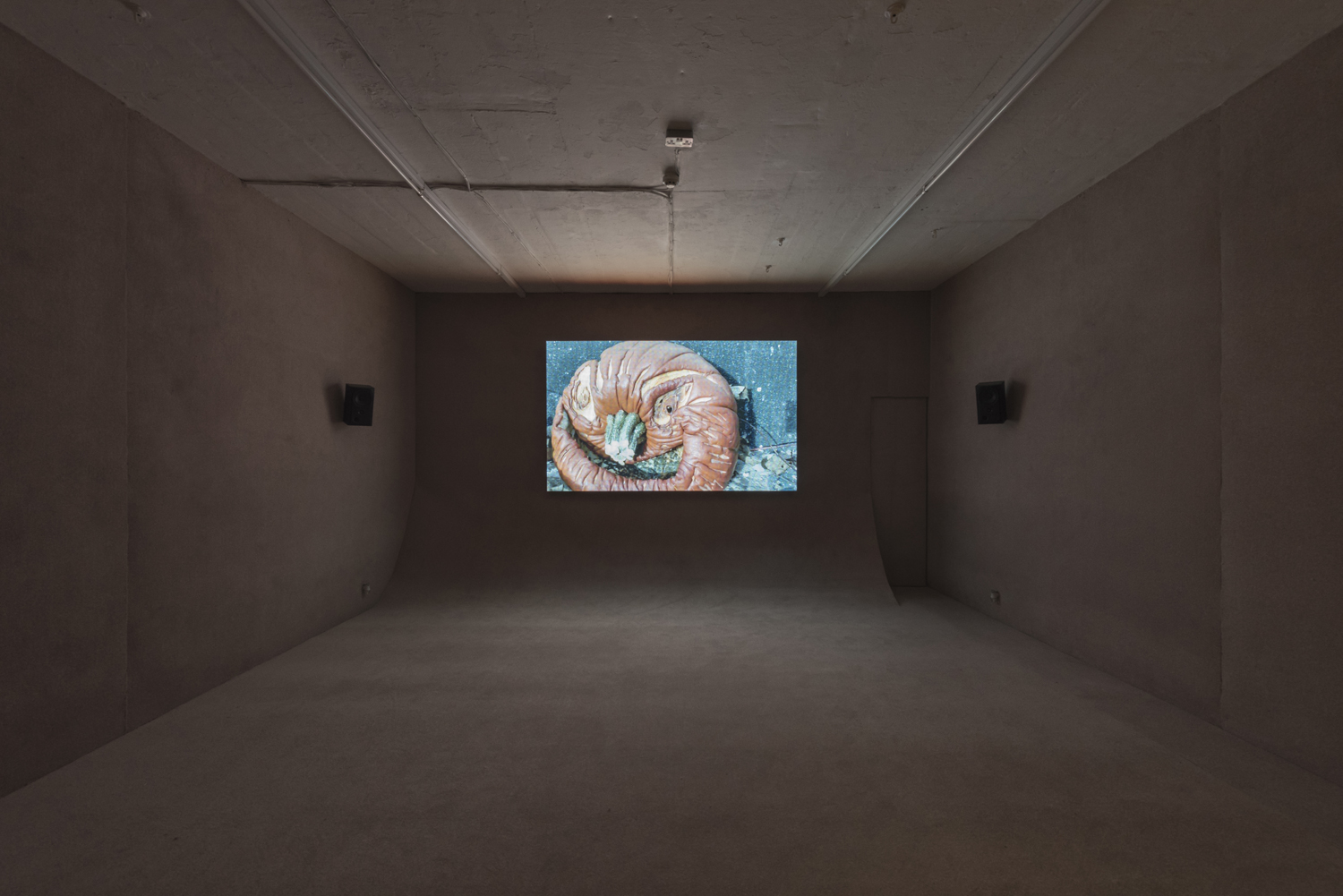Go Professional, Patrick Goddard, installation view Seventeen, 2017
review
Patrick Goddard
First published by Art Monthly, June 2017
Go Professional, Seventeen, April 28th - 3rd June, 2017
We live, according to the essayist Adam Kotsko, in an ‘awkward age’. In his short and admittedly monocultural book on the subject, the author ascribes the ubiquity of this uneasy social dynamic to the dissolution of ‘stable norms’ by the identity fracturing cultural upheavals of the 1960s and, more recently, to the post-industrial formation of a precarious and entrepreneurial cognitariat who adopt and exploit certain lifetsyles with an ease not afforded to all. This is a form of awkwardness that may be viewed as a symptom of systemic socio-economic factors. But must awkwardness always delineate an interpersonal impasse at the boundaries of cultural identity? In a present stiflingly defined by the dull reverberations of the echo chamber, could awkwardness provide a viable vector for renewed understanding between those not commonly predisposed to seeing eye to eye?
The three short films comprising Patrick Goddard’s exhibition ‘Go Professional’, are by turns awkward, astute, cringe-inducing and truly laugh-out-loud funny. From Walden-esque self-sufficiency, through the disorienting predictions of speculative finance to the social obligations of an artist on residency, these films trace the moral underpinnings of lifestyles that express a complicity with, or assumed alternative to, post-crash capital. They do this by staging a series of uncanny, possibly semi-scripted interviews that subject the very presumption of artistic moral rectitude to the same scrutiny that it has itself been habitually inclined to level at supposedly bovine utopianism or bullish avarice.
With Gone to Croatan, 2014, the first work encountered here in a series of atmospheric video installations, the artist sets the tone and form of his mockumentary style, tracking down an old friend who dropped off the map into a life of solitary self-reflection and pious asceticism. Shot entirely with a head-mounted Go-Pro camera, the film documents a series of intimate conversations either by campfire, while out foraging for food or traipsing through the tilled fields of rural Cambridgeshire. ‘We all know there’s something terribly wrong with society,’ the film’s subject, Adam, intones, ‘but we can’t agree on how to fix it.’ What emerges is an image of naive, practised idealism, frequently undercut by Goddard’s acerbic dismissals that retreating into the woods might be nothing more than a ‘middle-class luxury’; a cynicism that quickly appears mannered in the face of Adam’s earnest quietist efforts to justify his retreat.
Greater Fool Theory, 2015, shown in a suitably spartan office space replete with swivel chairs, pursues another subject from the artist’s childhood: Sam, now working as a quantitative analyst for HSBC. As Goddard visits Sam at home or in the plazas and public squares of Canary Wharf, a lyrical sparring unfolds that pits the ethics of financial speculation against the supposed critical lucidity of the artist. Goddard’s attempts to portray banking as a cloistered and self-perpetuating evil are brilliantly countered by Sam’s observation that art school is nothing but a ‘deluge of opinion spouted by dickheads in haircuts’. ‘You all go there at a scarily young age to be indoctrinated in ill-thought-through pseudo-socialist politics,’ he suggests, ‘it’s like you get your political opinions via group text message from central artist HQ run by Jeremy Deller.’
Indeed, Goddard receives further chastisement from Dagenham-based artist Ravinder Atwal, who, at the outset of Tune Into Sanity FM!, 2017, chides that ‘the last thing this area needs is some middle-class artist shipped here from trendy Hackney, reducing it to a few scraps of angsty prose-fucking-poetry’. It is a statement made all the more of an affront by the preceding few minutes of film in which the artist has done exactly that, delivering a series of gritty topographical takes on the condition of this east London borough.
Goddard’s previous films, chapbooks and performances have consistently characterised his artistic output as a testing conflation of contradictions, a situation effectively skewered by his schizoid performance No Ironic Tip of the Hat to Class Consciousness Can Save Us Now! (performed at Grand Union, Birmingham in 2015), which paired the pursuit of authenticity and political virtuosity with an aloofness to the realisation that an artist’s actions might easily slake the thirst of the gentrification juggernaut. His hallmark off-camera monologues, delivered with a caustic relish, resound like Pierre Bourdieu’s social analyses re-penned by virtuoso comic book author Grant Morrision, and his purposefully modish appropriation of the textural vocabulary of ‘urban decline’ seems to echo the putrid confessionals of Louis Ferdinand Céline, whose own semi-fictionalised biographical works were explorations of guilt and cowardice set amid the ‘authenticating’ disease-scapes of cities in ruin.
‘Awkwardness isn’t static,’ Kotsko writes, ‘it spreads.’ And laughing and cringing along to Goddard’s films becomes a strangely infectious affair. The works comprising ‘Go Professional’ are wonderfully disarming, restaging awkwardness as a discursive practice in which some kind of understanding might come from the vulnerability of embarrassment and its often blathering conversational rectification.

